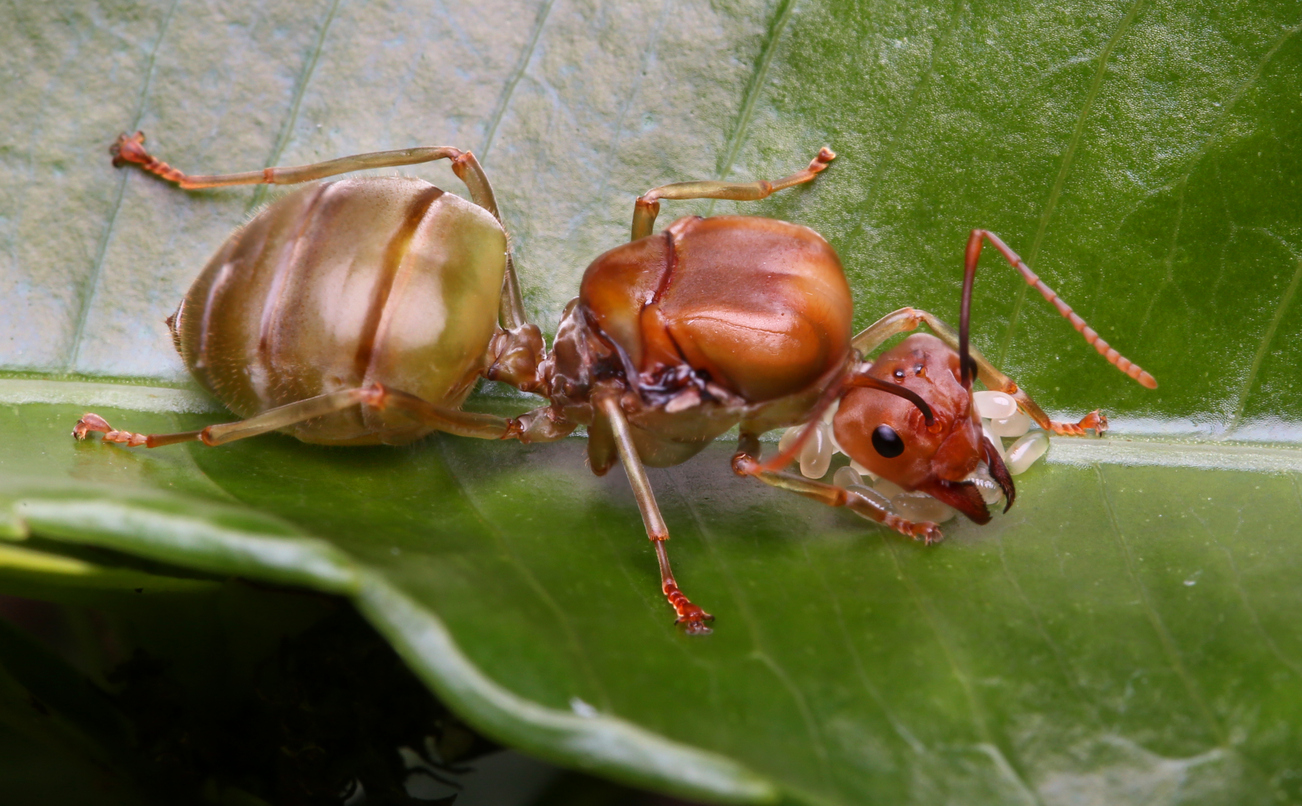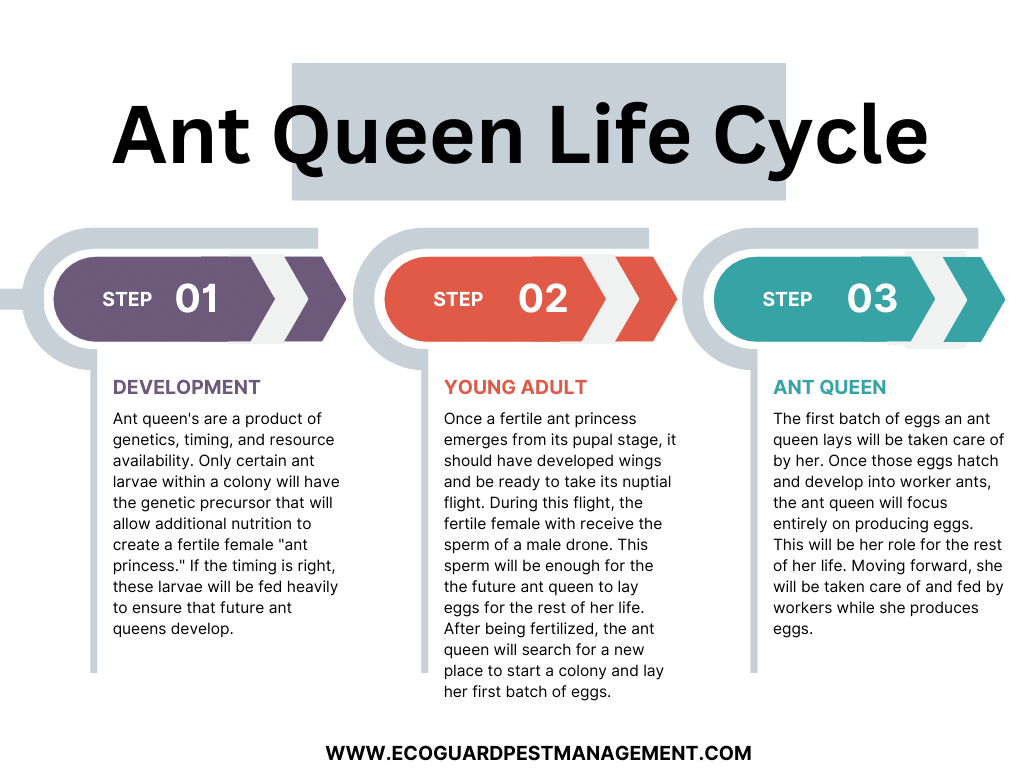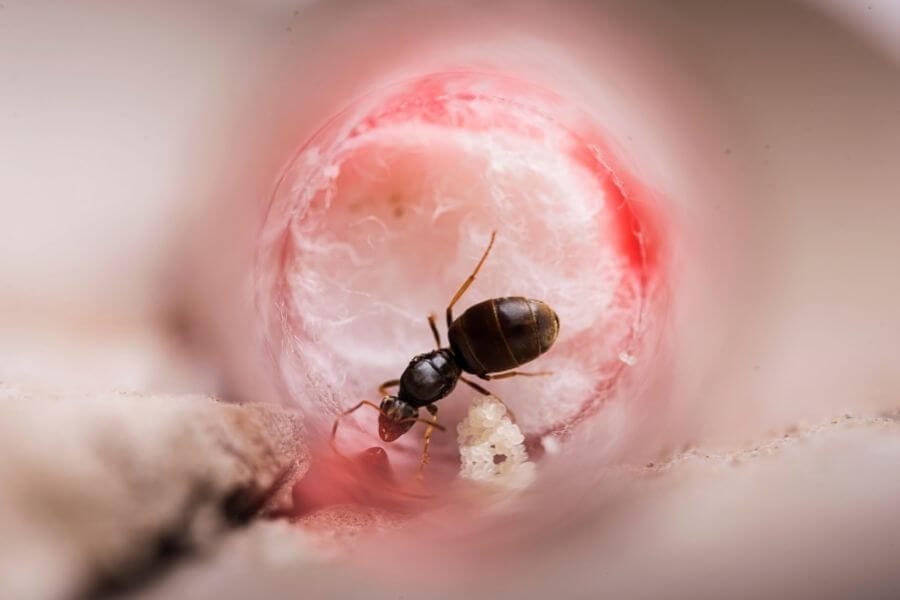If a queen ant dies, the colony can survive but with no new egg production. The worker ants will continue their tasks.
An ant colony can endure for months without a queen, maintaining normal activities such as food collection. However, the absence of a queen means no new ants can be produced, which may eventually lead to the colony’s decline. While worker ants cannot replace the queen or produce a new one, the colony will persist until the existing ants expire.
The queen’s death impacts the colony’s future sustainability, ultimately affecting its population dynamics and longevity.

Credit: knockoutpest.com
The Impact Of A Queen Ant’s Death
If a Queen Ant dies, the colony can still survive for months without her. However, there won’t be any new eggs produced, and the colony’s days are limited as new ants cannot replace the ones that die off. Without the Queen’s presence, worker ants will continue to collect food, but there will be no changes in their behavior or directives.
The Impact of a Queen Ant’s DeathA Shift in the Colony DynamicsWhen a queen ant dies, the entire colony can experience a significant shift in their dynamics. As the matriarch of the colony, the queen plays a vital role in regulating the behavior and activities of the worker ants. Without her presence, the colony may undergo a restructuring of roles and responsibilities, potentially leading to changes in their foraging and nesting behavior.Effects on Egg ProductionThe loss of a queen ant also has a direct impact on the colony’s egg production. As the sole reproductive individual, the queen is responsible for laying eggs, ensuring the continuation and growth of the colony. Her absence can lead to a halt in egg-laying, resulting in a decline in the colony’s population over time.Continuation of Worker Ant ActivitiesDespite the queen’s absence, the worker ants will continue their routine activities such as foraging for food and maintaining the nest. The directives given by the queen prior to her death will persist, driving the worker ants to carry on with their responsibilities. However, the colony’s survival may be compromised in the long term without a viable replacement for the queen.In summary, the death of a queen ant can disrupt the colony’s dynamics and lead to a decrease in egg production. Although worker ants will continue their activities, the long-term survival of the colony may be at risk without a queen to sustain its growth and reproduction.Challenges In Replacing A Queen Ant
If the queen ant dies, the colony’s survival is at risk. Worker ants cannot take her place, nor raise a replacement. This affects egg production, and ultimately, the colony’s future. In a single queen species, the colony may perish without her.
Limited Options For A New Queen
Ant colonies face a critical challenge when their queen dies: Limited options exist for replacing the crucial figurehead. Without a viable queen, the survival of the entire colony hangs in the balance.
Inability Of Worker Ants To Become Queens
Worker ants, despite their resourcefulness, cannot transform into queens: They lack the genetic makeup necessary for this transition. Unlike honey bees, where workers can foster a new queen, ant colonies face a unique obstacle in this aspect.
Consequences Of Squashing A Queen Ant
Eventual Demise Of The Entire Colony
When a queen ant is squashed, the colony is doomed to perish. The ants do not relocate to a new nest but continue their activities until their demise.
Lack Of Colony Relocation
Ants do not abandon their current settlement if the queen dies, leading to a lack of relocation efforts. The colony’s survival becomes uncertain without the presence of a queen.

Credit: drdeathpestcontrol.com
The Fate Of An Ant Colony Without A Queen
The Fate of an Ant Colony Without a Queen
Limited Lifespan Of The Colony
When a queen ant dies, the fate of the ant colony is jeopardized. Ant colonies have a limited lifespan without a queen, as the colony relies on the continuous production of eggs by the queen to sustain itself. The queen is vital for the survival and growth of the colony, and without her, the colony’s future is uncertain.
Inability To Replace Deceased Ants
Ant colonies are incapable of replacing deceased ants without a queen. In the absence of a queen, worker ants are unable to accept another ant as a new queen, nor can they transform themselves into a queen. This inability to replace the deceased queen results in the eventual decline and demise of the ant colony.
Strategies To Address A Queen Ant’s Death
When a queen ant dies, it poses a significant challenge to the survival of the ant colony. The queen ant is responsible for laying eggs and producing new generations of worker ants, so her absence can disrupt the colony’s reproductive cycle. However, there are several strategies that ants employ to mitigate the impact of a queen’s death and ensure the longevity of the colony.
Predator Protection
Predator protection is crucial for the survival of an ant colony, especially in the absence of a queen. Worker ants must prioritize the safety of the colony to prevent any further loss. Here are some strategies ants use to protect themselves from predators:
- Increased vigilance: Worker ants will increase their watchfulness to detect and ward off potential threats. They become more alert and responsive to any signs of danger, such as approaching predators or intruders.
- Group defense: If a predator poses a direct threat, worker ants will join forces to defend the colony. They may swarm the predator, using their combined strength and numbers to overpower it.
- Chemical signaling: Ants use chemical signals known as pheromones to communicate with one another. In the absence of a queen, worker ants may release alarm pheromones to alert their nestmates of potential danger.
Introduction Of A New Queen
While some ant species cannot replace a queen once she dies, others have adapted mechanisms to introduce a new queen. Here are some strategies ants utilize to ensure the continuation of the colony:
- Virgin queens: In certain ant species, worker ants groom and feed selected larvae to develop them into potential replacement queens. If they sense the absence or impending death of the queen, they will accelerate the development of a new queen as a contingency plan.
- Colony fusion: In some cases, neighboring ant colonies may join forces and merge into a single supercolony when a queen dies. This allows them to combine their resources, workforce, and genetic diversity, ensuring the survival and resilience of the ant community.
- “Gamergates”: In certain ant species, worker ants can transform themselves into gamergates, which are specialized reproductive females. These gamergates can mate and lay eggs, essentially assuming the role of the queen and maintaining the colony’s reproductive cycle.
In conclusion, when a queen ant dies, worker ants employ various strategies to address the loss and ensure the survival of the ant colony. Predator protection mechanisms and the introduction of a new queen are crucial for the longevity and resilience of the ant community. These adaptive strategies demonstrate the remarkable resilience and complex social organization of ants in the face of challenges.

Credit: www.ecoguardpestmanagement.com
Frequently Asked Questions On What If A Queen Ant Dies
Can Ants Survive Without A Queen?
Yes, ants can survive without a queen. The colony can last for months, but egg production stops.
Can An Ant Queen Be Replaced?
Once an ant queen dies, the colony can’t replace her, leading to eventual extinction.
What Happens If You Squish A Queen Ant?
Squishing a queen ant will lead to the eventual death of the colony. Ants won’t relocate, but continue as usual until they perish.
What Kills The Queen Ant?
The queen ant’s death will eventually lead to the colony’s demise as new ants cannot replace those that die off. The remaining ants will continue to act as if the colony is intact until they are either killed by predators or die of old age.
Note: The above answer is an AI-generated response and may not fully reflect the accuracy of the information provided. It is always recommended to consult with a professional entomologist or pest control expert for specific questions about ants and their behavior.
Conclusion
The death of a queen ant does not immediately spell doom for the colony. The workers will carry on as usual but without the ability to reproduce, the colony’s lifespan is limited. Unfortunately, new ants cannot replace those that die off, ultimately leading to the colony’s demise from old age or external causes.

I’m MD Tanvir, and I bring years of expertise gained from working closely with pest control companies to the forefront. My journey in the industry has inspired me to launch Bug Battler, a platform aimed at equipping people with the know-how to combat pests autonomously. Through Bug Battler, I aim to empower individuals with practical insights to tackle pest infestations effectively.

